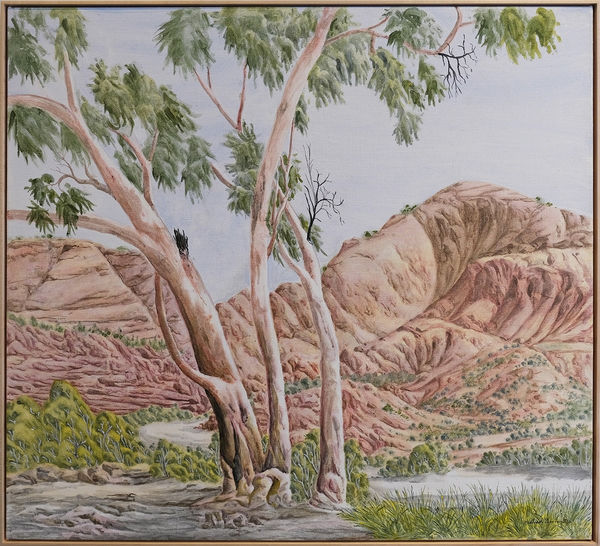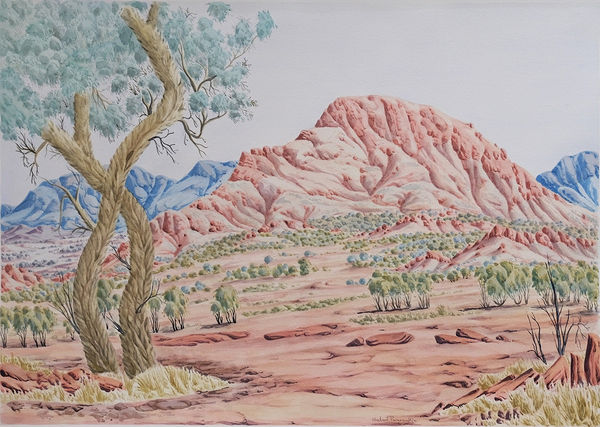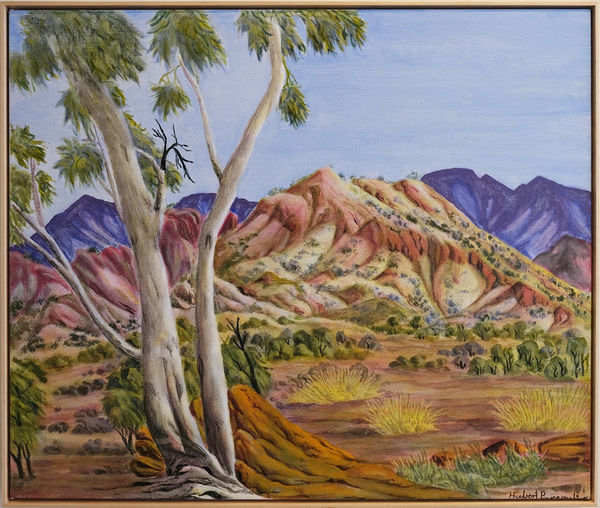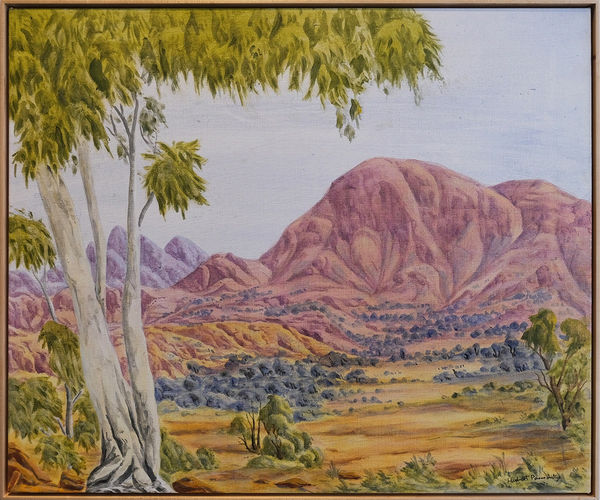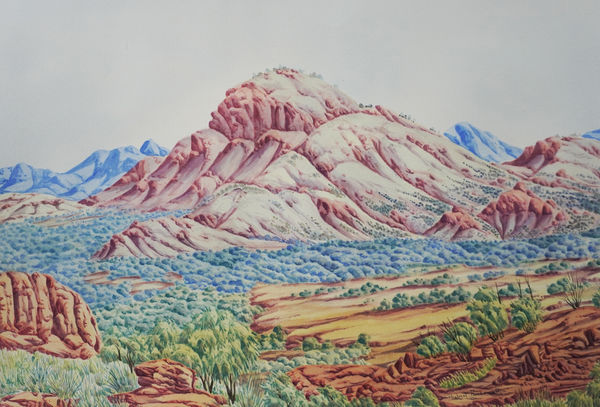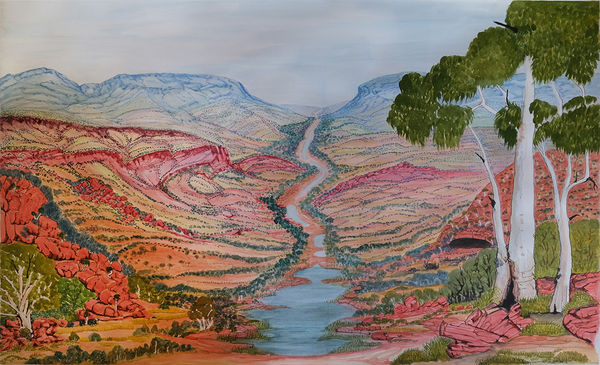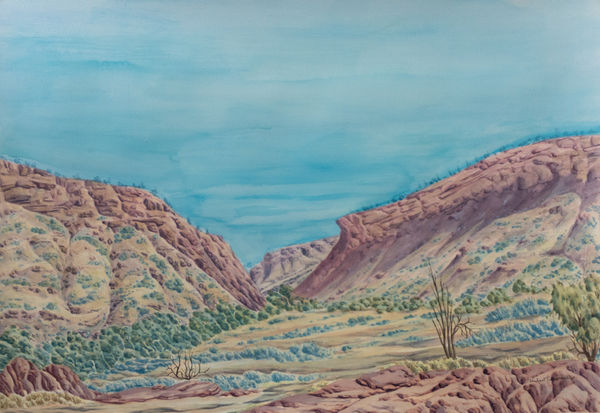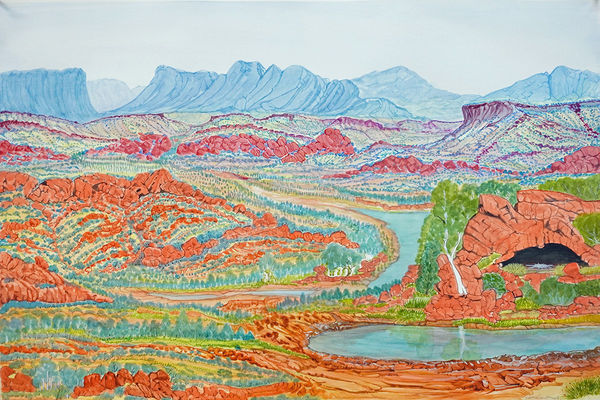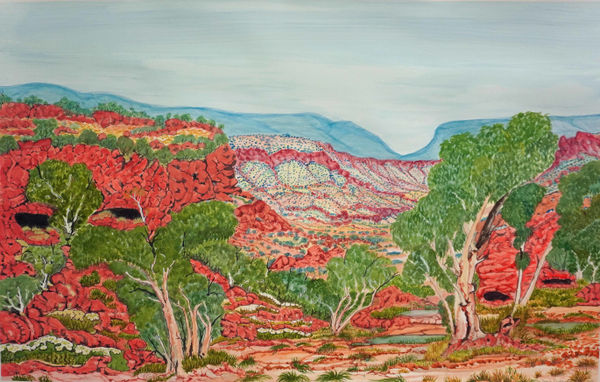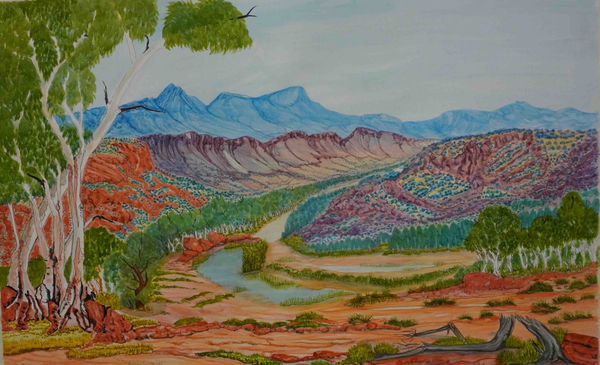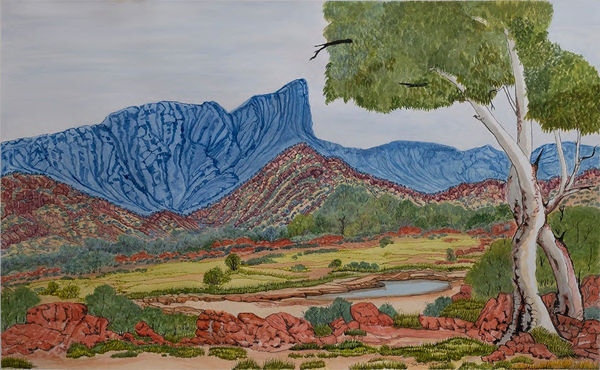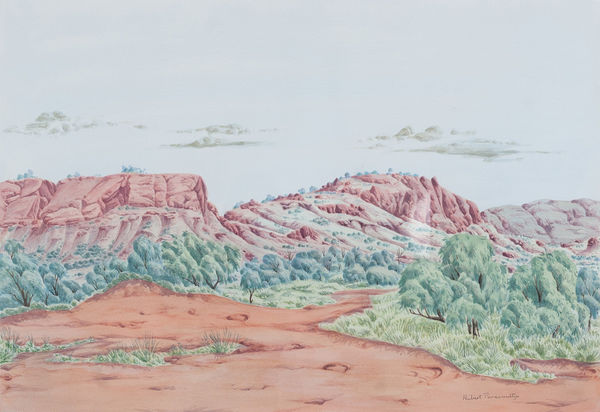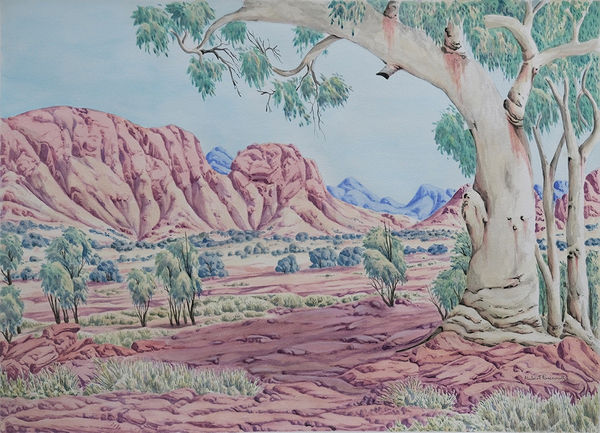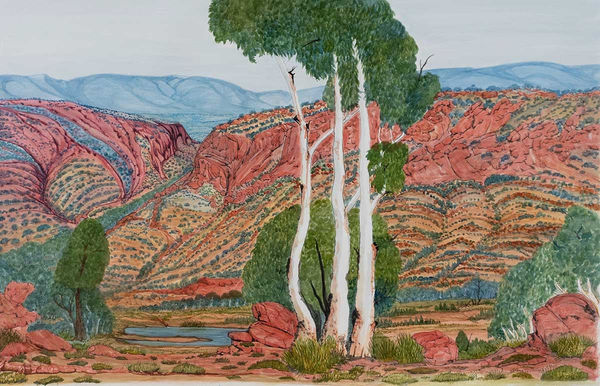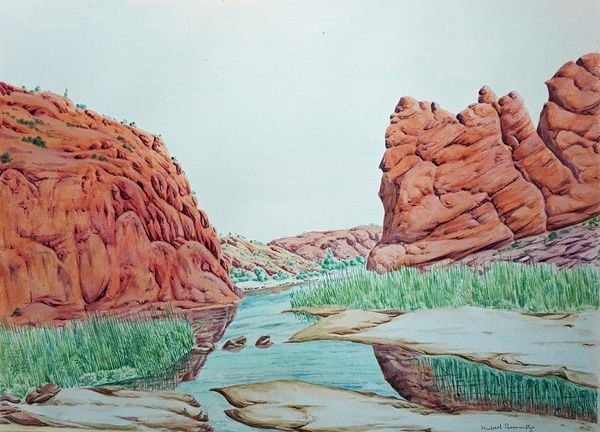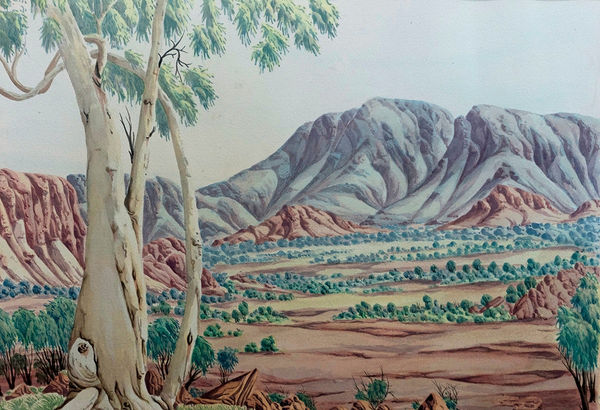Apmarra Nuka: Kumantjai (Hubert) Pareroultja & Selma Coulthard
-
-
Pareroultja and Coulthard use landscape as a medium of storytelling, building layers of meaning which stem back to their ancestral Tjukurrpa.
-
Ralph Hobbs
March, 2023
Hubert Pareroultja and Selma Coulthard walk in the tradition of the Hermannsburg watercolorists. Pareroultja and Coulthard use landscape as a medium of storytelling, building layers of meaning which stem back to their ancestral Tjukurrpa. Nanda\Hobbs proudly presents Apmarra Nuka, an exhibition bringing together these two figurehead artists, whose watercolours bear all the nuances of their desert homelands.
HUBERT PAREROULTJA
A few months ago, I stood on Aboriginal land with Hubert Pareroultja looking at the what was left of his family home. Spinifex bushes hid the remains of a broken wrought iron fireplace and several rusty flour tins. Three metal poles stood above the yellow buffel grass which concealed the old clay floor where he once slept. He lived here with his grandfather’s family and his father just over sixty years ago. The artist spoke of the stories he was told and the importance of Indigenous law that he continues to practice today. He smiled as he described his youth – of riding horses to Hermannsburg some 90 kilometres return to get supplies for the goats and other animals they kept. He reminisced about the days when they would roll a 44-gallon drum full of water over the sand-hills from the bore near the river that snakes its way through the landscape way off in the distance. It’s a remote, undoubtedly tough yet uniquely beautiful place. It is quintessentially the land of the Western Arrernte people.
It is this country that is at the heart of Pareroultja’s painting practice. He is an artist that paints what he sees, what he knows, and what he feels being in this place. The works are imbued with a deep understanding of the history of the land that transcends our Western notion of history. In his painting, there is a sensitivity in every aspect of the composition. He works methodically, carefully composing and drawing up each painting. His steady hand guides the brush through layered, translucent glazes of watercolour, each layer informing the next. There is a consummate understanding of the medium that allows every nuance of the landscape to be investigated. He knows everything about the colours in his landscape, the changes that happen throughout the day and the way light bounces off the ancient mountain ranges.
We travel further west to Luntjarra, the artist’s outstation. The hot wind whistles through the mulga trees, whirly whirly’s climb into the sky, everything feels dry here. Hubert’s isolated house is surrounded by a two metre high cyclone fence designed to keep the dingos away from his animals. There is a rough garden watered by solar pump, cattle yards, hay bales and a few broken cars lay derelict. It is organised in fashion and is his pride and joy. He comes most weekends and would live here full time if it was possible. He guides me to a special room in his house; all his most precious possessions are here. Then he shows me a beautiful photo of his mother and another old, creased image of him as a small boy holding a watercolour painting with his friends from the mission school that he attended. He shows another black and white photo his father, Reuben and uncles, Otto and Edwin, who were leaders of the Hermannsburg School of watercolour painters. They were taught to paint by the great Albert Namatjira. In the early 1930’s Namatjira started what is now called the Hermannsburg School of watercolour painting—a legacy that continues to this day. It is this lineage that Hubert Pareroultja proudly belongs to.
Since winning the prestigious Wynne Prize for landscape painting at the Art Gallery of NSW in 2020, Pareroultja is now acknowledged as the leading practitioner from the community with its long and rich cultural history. This exhibition is the culmination of the story of an artist whose unique vision of the land has been decades in the making. His practice morphs the ancient with the contemporary—a new world is revealed from the old. The artist’s importance to the ongoing development of the cultural fabric of this country cannot be understated.
SELMA COULTHARD
Selma Nunay Coulthard grew up in Hermannsburg (Ntaria). Her family are from Urrampinyi (Tempe Downs Station), a region located southwest of Alice Springs in Central Australia. She was born in Alice Springs in 1954, first living at Tempe Downs until the government agents removed her from her family and placed her in the Hermannsburg mission. Under the policy of protection, at the time the government would forcefully and sometimes brutally remove mix race children from their families. It was at the Hermannsburg mission where young Selma first saw the artists painting watercolours—in particular, Ivy Pareroultja.
When Coulthard speaks of her life and her people’s experiences from the arrival of the missionaries and cattlemen in the late 1800s, it is profoundly moving. You recognise that you’re in the presence of a powerful voice of human reason. Her understanding of the shared history of this country’s interior is immense. There is a calm eloquence in her words as she explains and paints landscapes of families torn apart by atrocities, and of the hope that comes from an enduring culture that binds her people to the land.
Despite the upheavals in her life, Coulthard has continued a deep connection to the law and the stories of her family. Her Tjukurpa (Dreaming) has had a sweeping effect on the essence of her work. As hallmarks of her practice, she paints with heightened colour, remarkable detail and a lyrical quality of line, finding intricate patterning in the landscape. Minor moments are given exquisite attention: a bowerbird nest, the webbed footprints of wild ducks. As if hidden within the picture plain, these visual moments invite the audience’s exploration and fascination. Moreover, they underline how Coulthard’s discernment of country extends far beyond the superficial rendering and adoration of an awe-inspiring view.
Despite Australia’s inhumane assimilation policies, Selma Coulthard harbours no bitterness—her act of painting is an important social statement. She talks of watercolour as therapy and her culture as a binding agent for all of us, not just for her people. The language and the stories that have imbued her work are far-ranging. Enacted with undoubted painterly skill, her work encompasses that of truth- telling, of life in the missions, of faith both traditional and Christian, and of a positive future.
-
Works
-
 Selma CoulthardAmulda James Range (Cat: 250-22), 2022Watercolour on paper61 x 96cm paper sizeSold
Selma CoulthardAmulda James Range (Cat: 250-22), 2022Watercolour on paper61 x 96cm paper sizeSold
92.5 x 123.5cm framed -
 Kumantji (Hubert) PareroultjaArmstrong Block, NT (Cat no: 336-22), 2022Watercolour on paper70 x 101cm paper sizeSold
Kumantji (Hubert) PareroultjaArmstrong Block, NT (Cat no: 336-22), 2022Watercolour on paper70 x 101cm paper sizeSold
135.5 x 129.5cm framed -
 Kumantji (Hubert) PareroultjaCentral Australian Landscape Cat no. 391-22, 2023Watercolour on paper72 x 102cmSold
Kumantji (Hubert) PareroultjaCentral Australian Landscape Cat no. 391-22, 2023Watercolour on paper72 x 102cmSold -
 Kumantji (Hubert) PareroultjaCentral Australian Landscape, Cat no. 3-23, 2023Watercolour on paper71 x 102cmSold
Kumantji (Hubert) PareroultjaCentral Australian Landscape, Cat no. 3-23, 2023Watercolour on paper71 x 102cmSold -
 Kumantji (Hubert) PareroultjaGhost Gum and Mount Hermannsburg -code 12012023, 2023Acrylic on linen101 x 112cmSold
Kumantji (Hubert) PareroultjaGhost Gum and Mount Hermannsburg -code 12012023, 2023Acrylic on linen101 x 112cmSold -
 Kumantji (Hubert) PareroultjaCorkwood Tree at Mount Giles, NT (Cat no:334-22), 2022Watercolour on paper71 x 101cm paper sizeSold
Kumantji (Hubert) PareroultjaCorkwood Tree at Mount Giles, NT (Cat no:334-22), 2022Watercolour on paper71 x 101cm paper sizeSold
102.5 x 131.5cm framed -
 Kumantji (Hubert) PareroultjaGhost Gum and Ranges After Rain code 6012023, 2023Acrylic on linen76 x 91cmSold
Kumantji (Hubert) PareroultjaGhost Gum and Ranges After Rain code 6012023, 2023Acrylic on linen76 x 91cmSold -
 Kumantji (Hubert) PareroultjaGhost Gum and Distant Ranges 2023 code 5012023Acrylic on linen76x91cmSold
Kumantji (Hubert) PareroultjaGhost Gum and Distant Ranges 2023 code 5012023Acrylic on linen76x91cmSold -
 Kumantji (Hubert) PareroultjaLtarkalibaka (MT Giles), NT (CAT: 157-22) , 2022Watercolour on paper103 x 132.5cm FSold
Kumantji (Hubert) PareroultjaLtarkalibaka (MT Giles), NT (CAT: 157-22) , 2022Watercolour on paper103 x 132.5cm FSold -
 Selma CoulthardOld Tempe Downs First Station, 2023Watercolour on paper61 x 97cm paper sizeSold
Selma CoulthardOld Tempe Downs First Station, 2023Watercolour on paper61 x 97cm paper sizeSold
-
 Kumantji (Hubert) PareroultjaNtaripe, Cat no. 7-23, 2023Watercolour on paper71 x 101cmSold
Kumantji (Hubert) PareroultjaNtaripe, Cat no. 7-23, 2023Watercolour on paper71 x 101cmSold -
 Selma CoulthardPetermann Ranges (Cat: 513-22), 2022Watercolour on paper63 x 93cm image sizeSold
Selma CoulthardPetermann Ranges (Cat: 513-22), 2022Watercolour on paper63 x 93cm image sizeSold
92.5 x 124.5 framed -
 Selma CoulthardPetermann Ranges (Cat: 215-22), 2022Watercolour on paper60 x 100cm paper sizeSold
Selma CoulthardPetermann Ranges (Cat: 215-22), 2022Watercolour on paper60 x 100cm paper sizeSold
93 x 123.5cm framed -
 Selma CoulthardPetermann Ranges NT (Cat: 329-22)Watercolour on paper61 x 96cm image sizeSold
Selma CoulthardPetermann Ranges NT (Cat: 329-22)Watercolour on paper61 x 96cm image sizeSold
93 x 123.5cm framed -
 Kumantji (Hubert) PareroultjaTjoritja (West MacDonnell Ranges), NT, cat no 496-21, 2021Acrylic on linen182 x 244cmSold
Kumantji (Hubert) PareroultjaTjoritja (West MacDonnell Ranges), NT, cat no 496-21, 2021Acrylic on linen182 x 244cmSold -
 Kumantji (Hubert) PareroultjaTjoritja (West MacDonnell Ranges), NT, (code 425-20), 2020Watercolour on 600gsm Arches cold press75 x 100cm paper sizeSold
Kumantji (Hubert) PareroultjaTjoritja (West MacDonnell Ranges), NT, (code 425-20), 2020Watercolour on 600gsm Arches cold press75 x 100cm paper sizeSold -
 Selma CoulthardTjoritja West McDonnell Ranges NT (Cat: 393-22)Watercolour on paper62 x 97cm image sizeSold
Selma CoulthardTjoritja West McDonnell Ranges NT (Cat: 393-22)Watercolour on paper62 x 97cm image sizeSold
93 x 123.5cm framed -
 Selma CoulthardTjoritja West McDonnell Ranges (Cat: 486-22), 2022Watercolour on paper61 x 97cm paper sizeSold
Selma CoulthardTjoritja West McDonnell Ranges (Cat: 486-22), 2022Watercolour on paper61 x 97cm paper sizeSold
92.5 x 124cm framed -
 Kumantji (Hubert) PareroultjaUntitled (Cat. 135-21), 2021Watercolour on paper75 x 100cmSold
Kumantji (Hubert) PareroultjaUntitled (Cat. 135-21), 2021Watercolour on paper75 x 100cmSold
-
 Kumantji (Hubert) PareroultjaUrana Tjina (James Range, NT) (Cat no: 245-22), 2022Watercolour on paper70 x 100cm paper sizeSold
Kumantji (Hubert) PareroultjaUrana Tjina (James Range, NT) (Cat no: 245-22), 2022Watercolour on paper70 x 100cm paper sizeSold
103.5 x 129.5cm framed -
 Kumantji (Hubert) PareroultjaUruna Tjina (James Range, NT) cat no.271-22Watercolour on paper75x106cmSold
Kumantji (Hubert) PareroultjaUruna Tjina (James Range, NT) cat no.271-22Watercolour on paper75x106cmSold -
 Selma CoulthardView from Palm Vallery into Boggy Hole (Cat: 8-23), 2023Watercolour on paper61 x 96cm image sizeSold
Selma CoulthardView from Palm Vallery into Boggy Hole (Cat: 8-23), 2023Watercolour on paper61 x 96cm image sizeSold
92 x 124cm framed -
 Selma CoulthardWaterhole near the Old Tempe Downs Station 21-23, 2022Watercolour on paper93x124cmSold
Selma CoulthardWaterhole near the Old Tempe Downs Station 21-23, 2022Watercolour on paper93x124cmSold -
 Selma CoulthardWest of Tempe Downs (Cat: 231-22), 2022Water colour on paper61 x 97cm paper sizeSold
Selma CoulthardWest of Tempe Downs (Cat: 231-22), 2022Water colour on paper61 x 97cm paper sizeSold
92.5 x 123.5 framed -

-
 Kumantji (Hubert) PareroultjaGum Tree and Mount Zeil (CAT: 28-23) , 2023Watercolour on paper102.5 x 131.5 cm framedSold
Kumantji (Hubert) PareroultjaGum Tree and Mount Zeil (CAT: 28-23) , 2023Watercolour on paper102.5 x 131.5 cm framedSold
-





